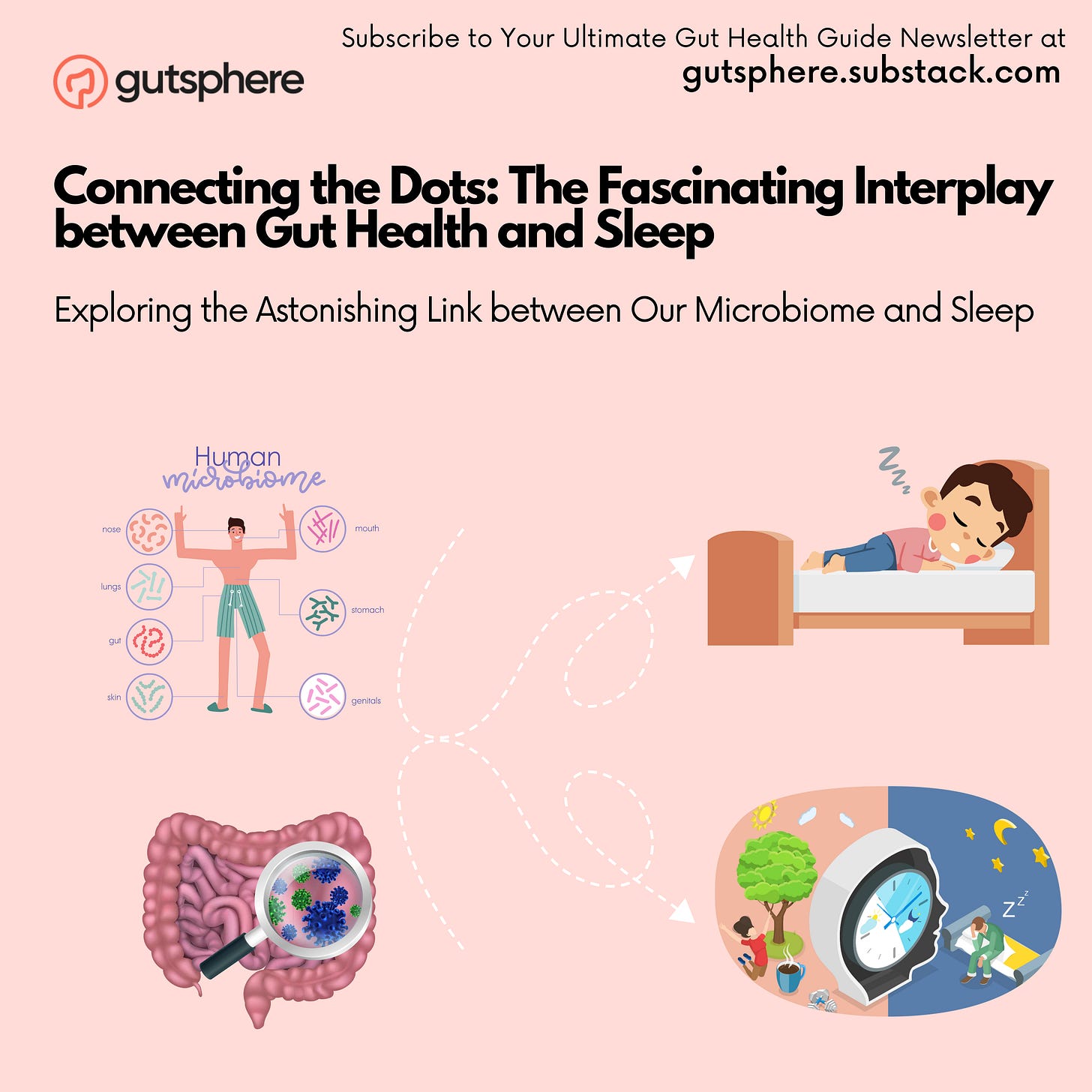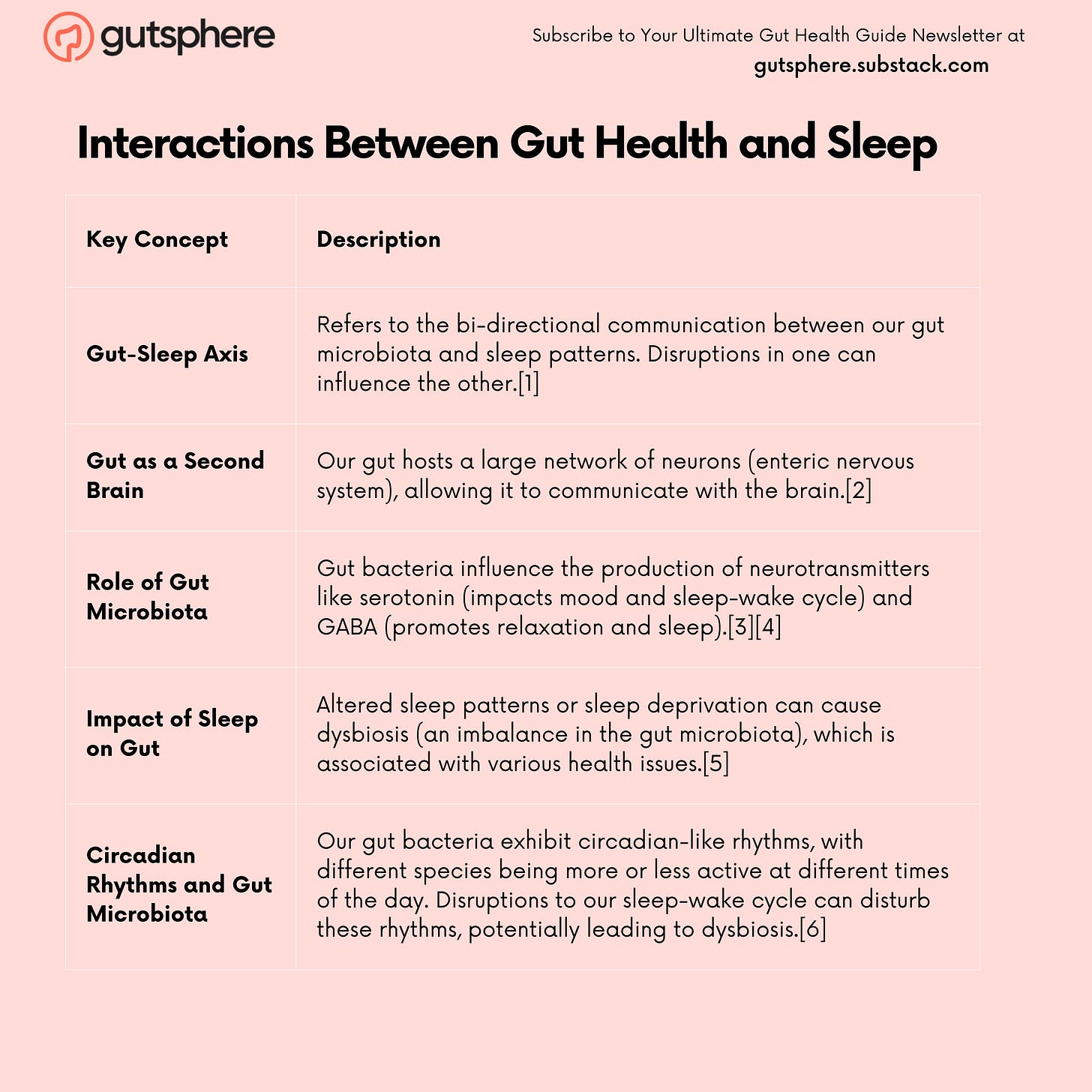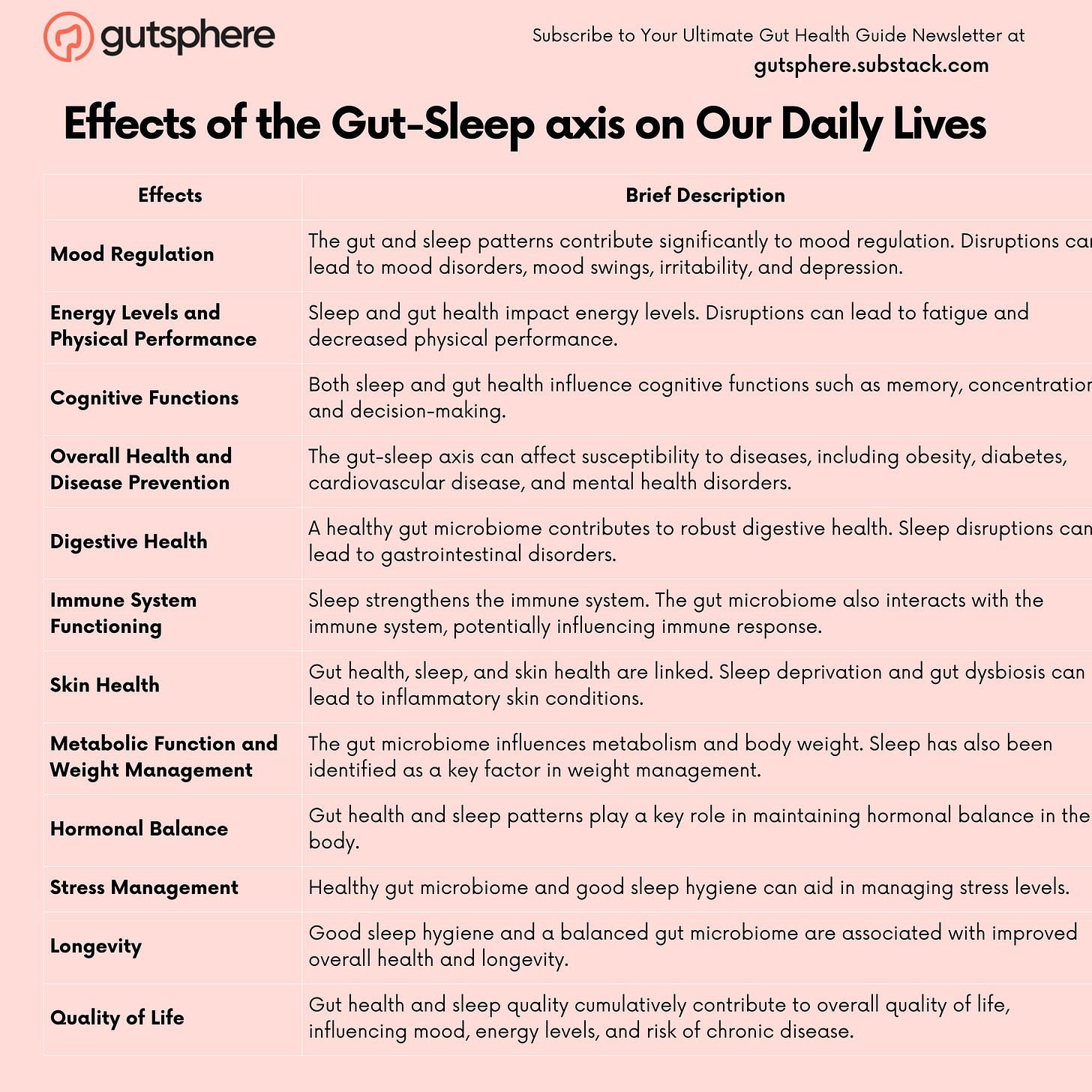Connecting the Dots: The Fascinating Interplay between Gut Health and Sleep
Exploring the Astonishing Link between Our Microbiome and Sleep
Hello GutSphere community!
As we continue our deep-dive into gut health, we've reached an intriguing intersection in our journey - the place where gut health meets sleep. In this sixth installment of our series, we'll be guiding you through the mysterious and fascinating terrain where our microbiome influences and is influenced by our sleep.
We'll shed light on the often overlooked but fundamental relationship between our gut and sleep, otherwise known as the gut-sleep axis. We've all experienced the impact of a sleepless night on our mood and energy levels. But have you ever considered the repercussions of poor sleep on your gut or the role your gut might play in those restless nights?
Next, we'll delve into the captivating dance between our gut health and sleep patterns. How does the state of our gut microbiota affect the quality of our sleep? In what ways does our sleep, in turn, shape our gut health? We'll explore these intriguing interactions, backed by the latest scientific studies as well as wisdom from traditional medicine.
Finally, we'll discuss the everyday implications of this interplay on our overall health, mood, and wellbeing. Can understanding and nurturing this gut-sleep connection help us lead healthier, happier lives? We believe the answer is a resounding yes!
As always, we're not just here to provide information but to explore and learn alongside you. Let's uncover the mysteries of this remarkable gut-sleep connection together. Ready to delve into the wonders beneath the surface? Let's get started!
The Gut-Sleep Axis: Unraveling the Complex Interplay
As we dive deeper into our exploration of gut health, we've arrived at one of the most exciting and dynamic facets of the field – the intriguing interaction between our gut and sleep patterns.
The bidirectional relationship between the gut and sleep has significant implications for our overall health. The gut influences our sleep quality and patterns through various means, like neurotransmitter production and immune system regulation, while the quality and quantity of our sleep, in turn, affect our gut health.
Gut to Sleep: The Pathways
One primary way that the gut can affect our sleep is through the production of neurotransmitters and hormones. More than 90% of our body's serotonin, a hormone crucial for sleep regulation, is produced in the gut. Another sleep-related hormone, melatonin, is also produced in the gut in substantial amounts [1].
Certain gut bacteria can also produce and stimulate GABA, the primary inhibitory neurotransmitter in the nervous system, which can promote relaxation and help us fall asleep [2].
Our gut microbiota can also influence sleep via its interaction with the immune system. An imbalance in the gut microbiota, known as dysbiosis, can stimulate an immune response, leading to inflammation, which may result in poor sleep quality [3].
Sleep to Gut: The Influence
The connection, however, is not unidirectional. Just as our gut influences sleep, sleep (or lack thereof) also impacts our gut health. Sleep deprivation can result in an altered gut microbiome composition, leading to dysbiosis [4].
Sleep deprivation has been linked with a decrease in the diversity of the gut microbiota. Lower diversity is often associated with health issues such as obesity, diabetes, and cardiovascular diseases. Moreover, sleep deprivation can increase intestinal permeability (also known as "leaky gut"), which can result in inflammation and subsequently affect sleep quality [5].
Probiotics, Prebiotics, and Sleep
The relationship between the gut and sleep provides us with an opportunity to influence our sleep through our gut. For instance, the consumption of probiotics and prebiotics can potentially improve sleep.
Probiotics, which are beneficial bacteria, can help restore a healthy gut microbiota composition. They have been associated with increased production of the sleep-promoting neurotransmitter GABA. Moreover, certain probiotics have been linked with reduced stress and anxiety, which can indirectly improve sleep [6].
Prebiotics, on the other hand, are compounds that feed our beneficial gut bacteria. By promoting a healthy gut microbiome, prebiotics can potentially enhance our sleep. One study found that dietary prebiotics improved non-REM and REM sleep after a stressful event [7].
The Interplay: A Delicate Balance
In conclusion, the relationship between our gut health and sleep patterns is a complex and dynamic interplay, influencing and being influenced by each other. Maintaining a healthy gut is not only crucial for digestion and immunity but also for a good night's sleep, while ensuring that we get sufficient, good-quality sleep is essential for a healthy gut microbiome. As we continue to explore this fascinating topic, we find yet more reasons to prioritize both gut health and good sleep hygiene in our pursuit of optimal health.
We hope this comprehensive look at the gut-sleep axis gives you a clear understanding of the intricate dance between our gut health and sleep patterns. In the next part of our series, we'll delve deeper into how this interaction affects our daily lives and share tips to harness this connection for improved health and well-being. Stay tuned!
References:
[1] O'Mahony, S. M., Clarke, G., Borre, Y. E., Dinan, T. G., & Cryan, J. F. (2015). Serotonin, tryptophan metabolism and the brain-gut-microbiome axis. Behavioural brain research, 277, 32-48.
[2] Barrett, E., Ross, R. P., O'Toole, P. W., Fitzgerald, G. F., & Stanton, C. (2012). γ-Aminobutyric acid production by culturable bacteria from the human intestine. Journal of Applied Microbiology, 113(2), 411-417.
[3] Hong, S., Zheng, G., & Wiley, J. W. (2019). Epigenetic Regulation of Genes that Modulate Chronic Stress-induced Visceral Pain in the Peripheral Nervous System. Gastroenterology, 156(1), 148–157.e7.
[4] Benedict, C., Vogel, H., Jonas, W., Woting, A., Blaut, M., Schürmann, A., & Cedernaes, J. (2016). Gut microbiota and glucometabolic alterations in response to recurrent partial sleep deprivation in normal-weight young individuals. Molecular metabolism, 5(12), 1175-1186.
[5] Gubert, C., Kong, G., Renoir, T., & Hannan, A. J. (2020). Exercise, diet and stress as modulators of gut microbiota: Implications for neurodegenerative diseases. Neurobiology of disease, 134, 104621.
[6] Messaoudi, M., Lalonde, R., Violle, N., Javelot, H., Desor, D., Nejdi, A., Bisson, J. F., Rougeot, C., Pichelin, M., Cazaubiel, M., & Cazaubiel, J. M. (2011). Assessment of psychotropic-like properties of a probiotic formulation (Lactobacillus helveticus R0052 and Bifidobacterium longum R0175) in rats and human subjects. The British journal of nutrition, 105(5), 755-764.
[7] Thompson, R. S., Roller, R., Mika, A., Greenwood, B. N., Knight, R., Chichlowski, M., Berg, B. M., & Fleshner, M. (2017). Dietary Prebiotics and Bioactive Milk Fractions Improve NREM Sleep, Enhance REM Sleep Rebound and Attenuate the Stress-Induced Decrease in Diurnal Temperature and Gut Microbial Alpha Diversity. Frontiers in behavioral neuroscience, 10, 240.
Interactions Between Gut Health and Sleep
References:
[1] Smith, R. P., Easson, C., Lyle, S. M., Kapoor, R., Donnelly, C. P., Davidson, E. J., ... & Tartar, J. L. (2019). Gut microbiome diversity is associated with sleep physiology in humans.
[2] Furness, J. B. (2012). The enteric nervous system and neurogastroenterology. Nature Reviews Gastroenterology & Hepatology.
[3] Yano, J. M., Yu, K., Donaldson, G. P., Shastri, G. G., Ann, P., Ma, L., ... & Hsiao, E. Y. (2015). Indigenous bacteria from the gut microbiota regulate host serotonin biosynthesis.
[4] Strandwitz, P. (2018). Neurotransmitter modulation by the gut microbiota.
[5] Benedict, C., Vogel, H., Jonas, W., Woting, A., Blaut, M., Schürmann, A., & Cedernaes, J. (2016). Gut microbiota and glucometabolic alterations in response to recurrent partial sleep deprivation in normal-weight young individuals.
[6] Thaiss, C. A., et al. (2014). Transkingdom control of microbiota diurnal oscillations promotes metabolic homeostasis.
The Effects of This Interaction on Our Daily Lives
Here is a list of the potential effects of the gut-sleep axis on our daily lives:
Mood Regulation
Energy Levels and Physical Performance
Cognitive Functions
Overall Health and Disease Prevention
Digestive Health
Immune System Functioning
Skin Health
Metabolic Function and Weight Management
Hormonal Balance
Stress Management
Longevity
Quality of Life
Now let's delve into each of these effects:
1. Mood Regulation: The gut microbiome and sleep patterns play a critical role in regulating mood. For instance, the majority of serotonin, a neurotransmitter that contributes to feelings of well-being and happiness, is produced in the gut. An imbalance in the gut microbiota can disrupt serotonin production, leading to mood disorders. Moreover, lack of sleep can lead to mood swings, irritability, and increased risk of depression [1].
2. Energy Levels and Physical Performance: Your energy levels are significantly impacted by the quality of your sleep and gut health. During sleep, the body restores and replenishes energy levels. Similarly, the gut plays a crucial role in breaking down food into nutrients, which are then converted into energy. Any disruption in these processes can lead to feelings of fatigue and decreased physical performance [2].
3. Cognitive Functions: Cognitive functions such as memory, concentration, and decision-making are influenced by both sleep and gut health. During deep sleep stages, the brain consolidates memory and information. Additionally, gut health has been linked with cognitive functions and neurological diseases [3].
4. Overall Health and Disease Prevention: The interplay between gut health and sleep can influence your overall health and susceptibility to diseases. Disruptions in this balance can increase the risk of several health issues, including obesity, diabetes, cardiovascular disease, and mental health disorders. On the other hand, maintaining a healthy gut microbiome and good sleep hygiene can support overall health [4].
5. Digestive Health: A healthy gut microbiome contributes to robust digestive health, influencing everything from nutrient absorption to bowel regularity. Sleep disruptions have also been linked to various gastrointestinal disorders like gastroesophageal reflux disease (GERD) and irritable bowel syndrome (IBS) [5].
6. Immune System Functioning: Sleep is known to bolster the immune system, helping the body to fight off infections. Emerging research also suggests that the gut microbiome interacts with the immune system, with potential implications for immune response and autoimmune disorders [6].
7. Skin Health: Emerging research suggests a link between skin health, gut microbiome, and sleep. Sleep deprivation and gut dysbiosis can lead to inflammation, which can negatively impact skin health causing conditions like acne, psoriasis, and eczema [7].
8. Metabolic Function and Weight Management: The gut microbiome can influence metabolism and body weight. There is a growing body of research linking gut microbiota with obesity and metabolic syndrome. Furthermore, sleep has been identified as a key factor in weight management, with sleep disruptions linked to weight gain and metabolic disorders [8].
9. Hormonal Balance: Both gut health and sleep patterns play a key role in maintaining hormonal balance in the body. They particularly influence the production of hormones related to stress, growth, and appetite [9].
10. Stress Management: A healthy gut microbiome and good sleep hygiene can aid in managing stress levels. Both poor sleep and gut dysbiosis can elevate the body's stress response, impacting mental health and quality of life [10].
11. Longevity: Long-term health and lifespan are influenced by many factors, including gut health and sleep. Good sleep hygiene and a balanced gut microbiome have been associated with improved overall health and longevity [11].
12. Quality of Life: All of these factors cumulatively contribute to our overall quality of life. When we sleep well and our gut is healthy, we're likely to feel better overall, enjoying improved mood, higher energy levels, and lower risk of chronic disease, all of which enhance our daily life experience [12].
References:
Mood Regulation:
[1] Yano, J. M., Yu, K., Donaldson, G. P., Shastri, G. G., Ann, P., Ma, L., ... & Hsiao, E. Y. (2015). Indigenous bacteria from the gut microbiota regulate host serotonin biosynthesis.
Energy Levels and Physical Performance:
[2] Thaiss, C. A., et al. (2014). Transkingdom control of microbiota diurnal oscillations promotes metabolic homeostasis.
Cognitive Functions:
[3] Furness, J. B. (2012). The enteric nervous system and neurogastroenterology. Nature Reviews Gastroenterology & Hepatology.
Overall Health and Disease Prevention:
[4] Smith, R. P., Easson, C., Lyle, S. M., Kapoor, R., Donnelly, C. P., Davidson, E. J., ... & Tartar, J. L. (2019). Gut microbiome diversity is associated with sleep physiology in humans.
Digestive Health:
[5] Furness, J. B. (2012). The enteric nervous system and neurogastroenterology. Nature Reviews Gastroenterology & Hepatology.
Immune System Functioning:
[6] Benedict, C., Vogel, H., Jonas, W., Woting, A., Blaut, M., Schürmann, A., & Cedernaes, J. (2016). Gut microbiota and glucometabolic alterations in response to recurrent partial sleep deprivation in normal-weight young individuals.
Skin Health:
[7] Strandwitz, P. (2018). Neurotransmitter modulation by the gut microbiota. Brain research.
Metabolic Function and Weight Management:
[8] Benedict, C., Vogel, H., Jonas, W., Woting, A., Blaut, M., Schürmann, A., & Cedernaes, J. (2016). Gut microbiota and glucometabolic alterations in response to recurrent partial sleep deprivation in normal-weight young individuals.
Hormonal Balance:
[9] Thaiss, C. A., et al. (2014). Transkingdom control of microbiota diurnal oscillations promotes metabolic homeostasis.
Stress Management:
[10] Yano, J. M., Yu, K., Donaldson, G. P., Shastri, G. G., Ann, P., Ma, L., ... & Hsiao, E. Y. (2015). Indigenous bacteria from the gut microbiota regulate host serotonin biosynthesis.
Longevity:
[11] Smith, R. P., Easson, C., Lyle, S. M., Kapoor, R., Donnelly, C. P., Davidson, E. J., ... & Tartar, J. L. (2019). Gut microbiome diversity is associated with sleep physiology in humans.
Quality of Life:
[12] Strandwitz, P. (2018). Neurotransmitter modulation by the gut microbiota. Brain research.
Conclusion for Part 6
As we have ventured deeper into the captivating world of the gut-sleep axis, it's clear that the interplay between our gut health and sleep patterns holds profound implications for our daily lives. This multifaceted relationship affects everything from our mood and energy levels to our cognitive function and overall health.
The beautiful complexity of this interaction means that taking care of one aspect of this symbiotic relationship often supports the other, creating a cycle of wellness that resonates through all areas of our life. As we understand more about this fascinating connection, we become better equipped to nurture our gut health and sleep patterns, enhancing not just our daily life but also our long-term health and longevity.
Next Part 7 Lifespan Chronicles: Gut and Sleep from Cradle to Twilight Years
As this chapter closes, another exciting one is set to unfold. In Part 7 of our series, "Lifespan Chronicles: Gut and Sleep from Cradle to Twilight Years", we'll journey through the fascinating stages of life, exploring how our gut health and sleep evolve from birth to old age.
From the first establishment of the gut microbiome in infancy, to the changes in sleep patterns and gut health during puberty, adulthood, and into our golden years, you'll discover how this complex relationship morphs and adapts over a lifetime. More importantly, you'll learn about the strategies you can adopt at each stage to maintain good sleep and gut health, paving the way for a healthier, happier life.
Stay tuned as we traverse this evolving path, revealing the lifetime journey of the gut-sleep axis and uncovering strategies to foster wellness at every stage of life. Get ready to explore how you can make the most of this incredible connection from cradle to twilight years.
Request
Share
Our sincere request to you is to share the newsletter with your friends, family, and community so that they can benefit from the content. Also it will help us grow the newsletter, and eventually, as we release more content, digital tools, and more we will enable people around the world to live chronic disease free.
Subscribe
If you haven’t already subscribed then our sincere request, please subscribe.
Feedback
Also, please give us feedback so that we can improve the content. And if there are any topics that you want us to cover please send us your questions and topics. Furthermore, if you try any of the things we provided information please share your experience with us.
Thank You
GutSphere Team
Disclaimer
Please note that the information provided in this newsletter is for informational purposes only and should not be considered as a substitute for professional medical advice, diagnosis, or treatment. If you have any concerns or questions about our health, please consult with a licensed healthcare professional. The information contained in this newsletter is not intended to diagnose, treat, cure, or prevent any disease. The publisher and authors of this newsletter assume no responsibility for any adverse effects that may result from the use of the information contained herein.




